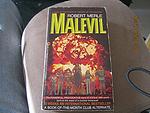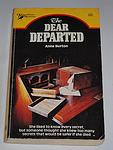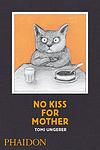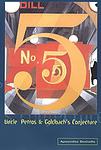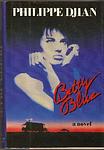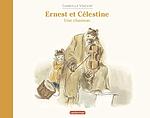The Greatest Greek, French "Fiction" Books Since 1970
Click to learn how this list is calculated.
This list represents a comprehensive and trusted collection of the greatest books. Developed through a specialized algorithm, it brings together 291 'best of' book lists to form a definitive guide to the world's most acclaimed books. For those interested in how these books are chosen, additional details can be found on the rankings page.
Genres
Countries
Date Range
Reading Statistics
Click the button below to see how many of these books you've read!
Download
If you're interested in downloading this list as a CSV file for use in a spreadsheet application, you can easily do so by clicking the button below. Please note that to ensure a manageable file size and faster download, the CSV will include details for only the first 500 books.
Download-
1. The Lover by Marguerite Duras
"The Lover" is a poignant exploration of forbidden love, power dynamics, and colonialism. Set in 1930s French Indochina, it tells the story of a tumultuous and passionate affair between a 15-year-old French girl and her wealthy, older Chinese lover. The narrative delves into the complexities of their relationship, the societal norms they defy, and the inevitable heartbreak that follows. The protagonist's struggle with her family's poverty and her mother's mental instability further complicates the story, making it a compelling exploration of love, desire, and societal constraints.
-
2. Life, a User's Manual by Georges Perec
The novel explores the lives of the inhabitants of a Parisian apartment block through a complex, multi-layered narrative. It delves into the interconnected stories of the building's residents, revealing their secrets, desires, and disappointments. The narrative is structured like a puzzle, with the author employing a variety of literary styles and devices, making it a complex and intriguing exploration of human life.
-
3. The Elementary Particles by Michel Houellebecq
"The Elementary Particles" is a provocative novel that explores the lives of two half-brothers, one a molecular biologist and the other a disenchanted teacher, against the backdrop of late 20th-century France. The narrative delves into their personal struggles and emotional turmoil, resulting from their dysfunctional upbringing by a self-absorbed, hedonistic mother. Throughout the novel, the author uses their stories to critique contemporary society, touching on themes such as sexual liberation, consumerism, and the decline of traditional values. The book also delves into the implications of scientific advancements, particularly in the field of molecular biology.
-
4. Delta of Venus by Anaïs Nin
"Delta of Venus" is a collection of fifteen short stories that explore the nature of human sexuality and eroticism. Set in various locations around the world, the book delves into a wide range of sexual experiences and desires, from the conventional to the taboo. The stories are as much about the psychology of desire and the power dynamics inherent in sexual relationships as they are about the act itself, and they are written in a lush, poetic style that is both explicit and deeply introspective.
-
5. Platform by Michel Houellebecq
"Platform" is a provocative novel that explores the intersections of sex, business, and terrorism. The protagonist, a middle-aged man working in the French Ministry of Culture, embarks on a journey to Thailand after the death of his father. While there, he falls in love with a travel executive and they start a business capitalizing on sex tourism. However, their venture is violently disrupted by an extremist group, leading to tragic consequences. The novel is a critique of Western consumerism and a commentary on the clash between Western and Islamic cultures.
-
6. W, or the Memory of Childhood by Georges Perec
"W, or the Memory of Childhood" is a unique blend of autobiographical recollections and fictional narrative. The novel alternates between two storylines: one describing the childhood of a Jewish boy during World War II, and the other detailing a dystopian society on a mysterious island known as "W". The book explores themes of memory, trauma, and the loss of innocence, while also offering a critique of totalitarian regimes. The two narratives gradually converge, revealing the traumatic underpinnings of the protagonist's life and the allegorical nature of "W".
-
7. The Bridge Of Beyond by Simone Schwarz-Bart
This novel is an evocative portrayal of several generations of women in Guadeloupe, a tapestry of their joys, sufferings, and resilient spirits against the backdrop of post-slavery Caribbean society. The story centers on the life of Telumee, the last in a line of proud Lougandor women, as she navigates the complexities of love, poverty, and the lingering effects of colonialism. Rich in Creole culture, the narrative weaves together the supernatural with the everyday, creating a lyrical and poignant exploration of the enduring human spirit and the bonds of family, tradition, and heritage that shape our destinies.
-
8. Suite Française by Irène Némirovsky
"Suite Française" is a two-part novel set during the early years of World War II in France. The first part, "Storm in June," follows a group of Parisians as they flee the Nazi invasion. The second part, "Dolce," shows life in a small French village under German occupation. The novel explores themes of love, loss, and survival, and provides a unique perspective on life in France during the war. The book was written during the war but was not discovered and published until many years later.
-
9. Malevil by Robert Merle
Set in the aftermath of a devastating nuclear war, the novel follows a group of survivors who find refuge in a medieval castle named Malevil. The survivors, led by the protagonist, must navigate the challenges of rebuilding their lives in a drastically altered world. They grapple with issues of survival, community, morality, and leadership as they encounter other groups of survivors with different philosophies and intentions. The story is a gripping exploration of human resilience, the will to maintain civilization, and the complexities of interpersonal relationships in a post-apocalyptic setting.
-
10. The First Man by Albert Camus
"The First Man" is a semi-autobiographical novel that explores the life of a man named Jacques Cormery, who grows up in poverty in Algeria, loses his father at a young age, and struggles with his relationship with his illiterate mother. The narrative delves into themes of identity, memory, and the human condition, as Jacques attempts to understand his past and his father's life, while simultaneously grappling with the harsh realities of colonial Algeria. Despite the challenges, Jacques remains determined to rise above his circumstances through education and personal growth.
-
11. Dear Departed by Marguerite Yourcenar
"Dear Departed" is a reflective and poignant exploration of the human condition, delving into themes of mortality, memory, and the enduring impact of the past on the present. Through a series of letters and personal narratives, the book weaves together the lives of various characters, each grappling with the loss of loved ones and the quest for meaning in the face of death. The narrative serves as a meditation on the ways in which individuals cope with grief and seek to preserve the essence of those they have lost, ultimately offering a profound commentary on the universal experience of mourning and the delicate balance between holding on and letting go.
-
12. Cleaned Out by Annie Ernaux
"Cleaned Out" is a poignant autobiographical novel that delves into the life of a young woman coming of age in post-war France. The narrative follows her journey from a working-class background through her experiences at a boarding school and university, where she grapples with the social and sexual mores of the time. The protagonist's struggle with an unwanted pregnancy and the subsequent illegal abortion is a central and harrowing theme, reflecting the broader issues of female autonomy and the class divide. The novel is a stark and unflinching exploration of identity, memory, and the societal pressures that shape the lives of women.
-
13. The Daughter by Pavlos Matesis
"The Daughter" is a powerful novel set in Greece during the Second World War. The narrative follows the life of a young girl who is forced to grow up quickly due to the harsh realities of war. Her father, a communist, is executed by the Germans, and the girl is left to navigate the complexities of life, politics, and love in a world that is rapidly changing. The book offers a poignant exploration of the human capacity for resilience, survival, and hope in the face of unimaginable adversity.
-
14. Astradeni by Eugenia Fakinou
"Astradeni" is a coming-of-age novel set in post-World War II Greece. The story follows the life of a young girl named Astradeni, who is forced to grow up quickly due to the harsh realities of war and poverty. Despite the hardships she faces, Astradeni maintains a hopeful and imaginative spirit, often escaping into a world of myths and legends. The novel explores themes of resilience, the power of storytelling, and the enduring strength of the human spirit.
-
15. No Kiss For Mother by Tomi Ungerer
"No Kiss For Mother" is a heartwarming children's book that follows a young boy named Toby who is determined to find the perfect gift for his mother on her birthday. Along the way, Toby encounters various animals who offer him advice and assistance, leading him to realize that the greatest gift he can give his mother is a heartfelt kiss. Through colorful illustrations and a charming storyline, the book emphasizes the importance of love and affection within a family.
-
16. Uncle Petros and Goldbach's Conjecture by Apostolos Doxiadis
The novel follows the story of a young man who becomes fascinated by his reclusive and eccentric Uncle Petros. As he delves into his uncle's past, he uncovers Petros' obsession with proving Goldbach's Conjecture, a famous unsolved problem in number theory. This obsession led to Petros' alienation from society and ultimately his downfall. The book explores themes of mathematical obsession, family relationships, and the fine line between genius and madness.
-
17. L'étrange Destin De Wangrin by Amadou Hampâté Bâ
"L'étrange Destin De Wangrin" by "Amadou Hampâté Bâ" is a captivating narrative that delves into the life of Wangrin, a complex and enigmatic figure in West African society. Through a series of interconnected stories, the book explores Wangrin's rise from a humble clerk to a powerful and influential figure, as well as his eventual downfall. Set against the backdrop of colonialism and cultural clashes, the novel offers a thought-provoking exploration of identity, power dynamics, and the consequences of one's choices.
-
18. Betty Blue: The Story of a Passion by Philippe Djian
Betty Blue: The Story of a Passion is a tragic love story set in rural France. The novel follows the passionate and tumultuous relationship between a handyman and a free-spirited, mentally unstable woman named Betty. As their relationship deepens, Betty's mental health deteriorates, leading to a series of dramatic and heartbreaking events. The story is a raw and poignant exploration of love, mental illness, and the devastating consequences of passion.
-
19. Βιοτεχνία Υαλικών by Menis Koumandareas
This novel delves into the life of a glass craftsman in Athens, exploring the intricate balance between tradition and the encroaching modernity of the 20th century. Through the protagonist's struggles and experiences, the narrative paints a vivid picture of the societal changes in Greece, highlighting the challenges faced by artisans trying to preserve their heritage and livelihoods amidst rapid industrialization and cultural shifts. The story is not just about the craft of glassmaking, but also a poignant commentary on the human condition, resilience, and the inevitable transformation of societies over time.
-
20. Whatever by Michel Houellebecq
"Whatever" is a satirical novel that explores the life of a depressed and disillusioned computer programmer working for a software company in Paris. The protagonist's life is characterized by his cynicism and indifference towards his job, his failed relationships, and society at large. His only relief comes from his philosophical musings about life and the human condition. The novel is a bleak critique of modern society and the isolation and alienation brought about by technology and capitalism.
-
21. The Late-night News by Petros Markaris
In "The Late-night News," a seasoned journalist is found murdered in his office. The investigation of the crime falls to a grizzled detective, who uncovers a web of corruption and deceit within the world of Greek media. As he delves deeper into the case, he finds that the journalist was working on a story that could have significant political implications, making the list of suspects long and dangerous. The detective must navigate through this complex world to find the killer, all while dealing with his own personal demons.
-
22. La Vie Et Demie by Sony Labou Tansi
"La Vie Et Demie" is a thought-provoking novel set in an unnamed African country, where an oppressive regime has seized power and implemented a bizarre policy of dividing its citizens into "halves" and "wholes." The story follows the life of a young girl named Sophie, who is born as a "half" and faces discrimination and hardship due to her status. Through Sophie's experiences, the author explores themes of identity, inequality, and the dehumanizing effects of totalitarianism, offering a powerful critique of social and political systems.
-
23. Le Jeune Homme De Sable by Williams Sassine
"Le Jeune Homme De Sable" is a thought-provoking novel that follows the journey of a young man named Sissoko, who is torn between his traditional African roots and the allure of the Western world. Set in postcolonial Africa, the book explores themes of cultural identity, colonialism, and the impact of globalization on the younger generation. Through Sissoko's experiences and encounters, the author delves into the complexities of modernity and the challenges faced by individuals striving to find their place in a rapidly changing society.
-
24. Childhood by Nathalie Sarraute
"Childhood" is a memoir that delves into the fragmented memories of the author's early years, exploring the complexities of growing up and the formation of identity. Through a series of vignettes, the narrative captures the nuanced emotions and experiences of a young girl navigating her way through the challenges of family dynamics, societal expectations, and self-discovery. The author employs an innovative literary style, characterized by introspection and a stream-of-consciousness approach, to reflect on the elusive nature of memory and the ways in which our childhood experiences shape who we become.
-
25. Ernest And Celestine by Gabrielle Vincent
"Ernest And Celestine" is a heartwarming children's book about an unlikely friendship between a bear named Ernest and a young mouse named Celestine. Despite societal expectations and prejudices, the two form a deep bond and defy the norms of their respective worlds. Through their adventures and challenges, they teach readers the importance of acceptance, friendship, and the power of love.
Reading Statistics
Click the button below to see how many of these books you've read!
Download
If you're interested in downloading this list as a CSV file for use in a spreadsheet application, you can easily do so by clicking the button below. Please note that to ensure a manageable file size and faster download, the CSV will include details for only the first 500 books.
Download







